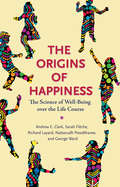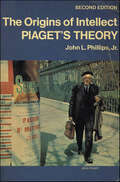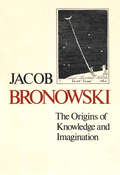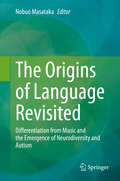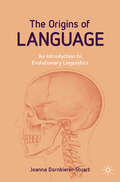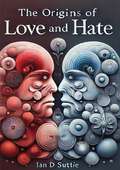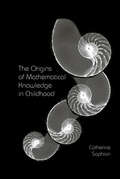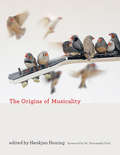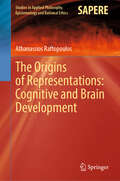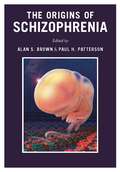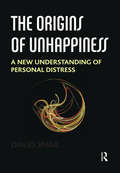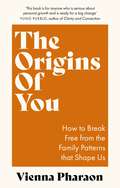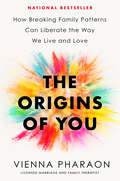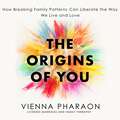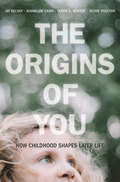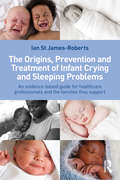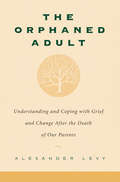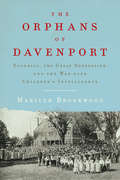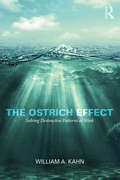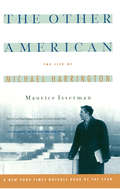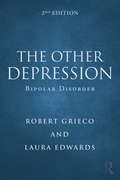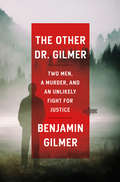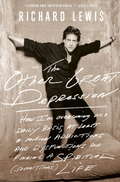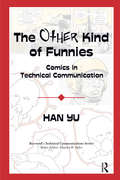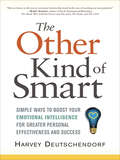- Table View
- List View
The Origins of Happiness: The Science of Well-Being over the Life Course
by Richard Layard Andrew E. Clark Sarah Flèche Nattavudh Powdthavee George WardWhat makes people happy? Why should governments care about people’s well-being? How would policy change if well-being was the main objective? The Origins of Happiness seeks to revolutionize how we think about human priorities and to promote public policy changes that are based on what really matters to people. Drawing on a uniquely comprehensive range of evidence from longitudinal data on over one hundred thousand individuals in Britain, the United States, Australia, and Germany, the authors consider the key factors that affect human well-being.The authors explore factors such as income, education, employment, family conflict, health, childcare, and crime—and their findings are not what we might expect. Contrary to received wisdom, income inequality accounts for only two percent or less of the variance in happiness across the population; the critical factors affecting a person’s happiness are their relationships and their mental and physical health. More people are in misery due to mental illness than to poverty, unemployment, or physical illness. Examining how childhood influences happiness in adulthood, the authors show that academic performance is a less important predictor than emotional health and behavior, which is shaped tremendously by schools, individual teachers, and parents. For policymakers, the authors propose new forms of cost-effectiveness analysis that places well-being at center stage.Groundbreaking in its scope and results, The Origins of Happiness offers all of us a new vision for how we might become more healthy, happy, and whole.
The Origins of Intellect: Piaget's Theory
by John L. Phillips Jr.The works published by the Swiss psychologist Jean Piaget and his associates during the past forty years constitute the largest repository of knowledge about the cognitive development of children that is available anywhere, and Piaget's general theory of intellectual development rivals, in scope and comprehensiveness, Freud's theory of personality developmentHere is a self-contained general summary of Piaget's theory, written at a relatively nontechnical level. It is suitable for use in a variety of courses in psychology and education -- child psychology, child development, educational psychology, learning, psychological systems, general psychology, and others. It will also interest professionals and educated laymen as a timely exposition of ideas that are attracting the attention of increasing numbers of American psychologists.In order to convey the complexities of the theory to readers who have had no previous contact with it, the author uses a number of unusual pedagogical devices. He first outlines the theory in an introduction that students can reread with increasing comprehension as they study the text. The main part of the book is an elucidation of the Piagetian periods of intellectual development, with enough illustrations of Piaget's research activities to give the theory meaning. The author frequently reproduces passages from Piaget's clinical observations with Piaget's interpretations deleted, so that the reader can assess his own understanding and better appreciate Piaget's style of inquiry. In an epilogue, the author discusses the educational implications of Piaget's work.
The Origins of Knowledge and Imagination
by Jacob BronowskiAdapted from a series of lectures by Bronowski that deals with one of the pivotal paradoxes that has plagued scientific thought.
The Origins of Language Revisited: Differentiation from Music and the Emergence of Neurodiversity and Autism
by Nobuo MasatakaThis book summarizes the latest research on the origins of language, with a focus on the process of evolution and differentiation of language. It provides an update on the earlier successful book, “The Origins of Language” edited by Nobuo Masataka and published in 2008, with new content on emerging topics.Drawing on the empirical evidence in each respective chapter, the editor presents a coherent account of how language evolved, how music differentiated from language, and how humans finally became neurodivergent as a species. Chapters on nonhuman primate communication reveal that the evolution of language required the neural rewiring of circuits that controlled vocalization. Language contributed not only to the differentiation of our conceptual ability but also to the differentiation of psychic functions of concepts, emotion, and behavior. It is noteworthy that a rudimentary form of syntax (regularity of call sequences) has emerged in nonhuman primates. The following chapters explain how music differentiated from language, whereas the pre-linguistic system, or the “prosodic protolanguage,” in nonhuman primates provided a precursor for both language and music. Readers will gain a new understanding of music as a rudimentary form of language that has been discarded in the course of evolution and its role in restoring the primordial synthesis in the human psyche. The discussion leads to an inspiring insight into autism and neurodiversity in humans. This thought-provoking and carefully presented book will appeal to a wide range of readers in linguistics, psychology, phonology, biology, anthropology and music.
The Origins of Language: An Introduction to Evolutionary Linguistics
by Joanna Dornbierer-StuartThis book offers an introduction to the multidisciplinary subject of evolutionary linguistics, which seeks to explain the biological origins of language and its subsequent development in humans. Roughly six million years ago, a branch of hominids from the forests of East Africa started to thrive in the drier environment created by the East African Rift System. A host of physical developments culminated in the brains of early humans increasing dramatically in size and cognitive power. Influenced by a unique and complex social organisation, communication signals became much more diverse and dependent on memory and learning mechanisms. But language is not only used to interact with our fellow beings. It is also closely connected to our thoughts. This makes language a biological, social, cultural and cognitive phenomenon all at once. What precise role did each of these aspects play in the emergence of language and how were they all coordinated to produce the most sophisticated communication system in the animal kingdom? The book aims to answer these questions and open up the fascinating world of evolutionary linguistics. It is not only aimed at scholars of linguistics, but also students from other disciplines (e.g., psychology, anthropology, evolutionary biology and cognitive science) who have an academic interest in language but may be approaching linguistics for the first time. In addition, the book should appeal to anyone with an interest in the workings of language in general, as well as advanced learners of English.
The Origins of Love and Hate
by Ian D Suttie Dr J. A. HadfieldThe Origins of Love and Hate by Ian D. Suttie offers a groundbreaking exploration of the psychological roots of human emotions, particularly focusing on love, hate, and their profound influence on relationships and mental health. Written in the early 20th century, this influential work challenges Freudian views of psychoanalysis by emphasizing the importance of emotional connection and social bonds in psychological development.Suttie’s central thesis is that human beings have a fundamental need for affection, which shapes emotional health from infancy through adulthood. He argues that early disruptions in nurturing relationships—particularly between mother and child—can lead to emotional conflict, producing feelings of rejection, hostility, or repressed hate. Suttie critiques Freud’s emphasis on instinctual drives, such as the death instinct, and instead highlights the role of love and attachment in shaping human behavior and personality.Throughout the book, Suttie provides insights into how unresolved emotional needs manifest in adult relationships, often causing psychological distress and alienation. His work foreshadows later developments in attachment theory and relational psychoanalysis, emphasizing the healing potential of empathy, love, and meaningful connection in therapeutic practice.Dr. J. A. Hadfield’s foreword contextualizes Suttie’s ideas within the broader field of psychoanalysis, acknowledging the originality and influence of his thought. The Origins of Love and Hate remains relevant to psychologists, therapists, and readers interested in human behavior, offering timeless insights into the emotional foundations of relationships.This work invites readers to reflect on how love, attachment, and rejection shape human experience and suggests that healing comes through restoring emotional bonds, making it an essential read for those interested in the psychology of emotions and relational well-being.
The Origins of Mathematical Knowledge in Childhood (Studies in Mathematical Thinking and Learning Series)
by Catherine SophianThis book examines the origins and development of children's mathematical knowledge. It contrasts the widely held view that counting is the starting point for mathematical development with an alternative comparison-of-quantities position. According to the comparison-of-quantities position, the concept of number builds upon more basic concepts of equality, inequality, and less-than and greater-than relations, which derive from comparisons between unenumerated quantities such as lengths. The concept of number combines these basic comparative concepts with the concept of a unit of measure, which allows one quantity to be described as a multiple of another. Sophian examines these alternative accounts of children's developing mathematical knowledge in the light of research: on children's counting; on their reasoning about continuous quantities such as length and area; on the development of the concept of unit; on additive and multiplicative reasoning; and on knowledge about fractions. In the closing chapters, Sophian draws out the developmental and the educational implications of the research and theory presented. Developmentally, the comparison-of-quantities position undermines the idea that numerical knowledge develops through domain-specific learning mechanisms in that it links numerical development both to physical knowledge about objects, which is the starting point for the concept of unit, and to the acquisition of linguistic number terms. Instructionally, the comparison-of-quantities perspective diverges from the counting-first perspective in that it underscores the continuity between whole-number arithmetic and fraction learning that stems from the importance of the concept of unit for both. Building on this idea, Sophian advances three instructional recommendations: First, instruction about numbers should always be grounded in thinking about quantities and how numbers represent the relations between them; second, instruction in the early years should always be guided by a long-term perspective in which current objectives are shaped by an understanding of their role in the overall course of mathematics learning; and third, instruction should be directly toward promoting the acquisition of the most general mathematical knowledge possible. The Origins of Mathematical Knowledge in Childhood is intended for researchers, professionals, and graduate students in developmental psychology, educational psychology, and mathematics education, and as a supplementary text for advanced undergraduate courses in cognitive development, educational psychology, and mathematics education.
The Origins of Musicality
by Henkjan HoningInterdisciplinary perspectives on the capacity to perceive, appreciate, and make music. Research shows that all humans have a predisposition for music, just as they do for language. All of us can perceive and enjoy music, even if we can't carry a tune and consider ourselves “unmusical.” This volume offers interdisciplinary perspectives on the capacity to perceive, appreciate, and make music. Scholars from biology, musicology, neurology, genetics, computer science, anthropology, psychology, and other fields consider what music is for and why every human culture has it; whether musicality is a uniquely human capacity; and what biological and cognitive mechanisms underlie it. Contributors outline a research program in musicality, and discuss issues in studying the evolution of music; consider principles, constraints, and theories of origins; review musicality from cross-cultural, cross-species, and cross-domain perspectives; discuss the computational modeling of animal song and creativity; and offer a historical context for the study of musicality. The volume aims to identify the basic neurocognitive mechanisms that constitute musicality (and effective ways to study these in human and nonhuman animals) and to develop a method for analyzing musical phenotypes that point to the biological basis of musicality. Contributors Jorge L. Armony, Judith Becker, Simon E. Fisher, W. Tecumseh Fitch, Bruno Gingras, Jessica Grahn, Yuko Hattori, Marisa Hoeschele, Henkjan Honing, David Huron, Dieuwke Hupkes, Yukiko Kikuchi, Julia Kursell, Marie-Élaine Lagrois, Hugo Merchant, Björn Merker, Iain Morley, Aniruddh D. Patel, Isabelle Peretz, Martin Rohrmeier, Constance Scharff, Carel ten Cate, Laurel J. Trainor, Sandra E. Trehub, Peter Tyack, Dominique Vuvan, Geraint Wiggins, Willem Zuidema
The Origins of Representations: Cognitive and Brain Development (Studies in Applied Philosophy, Epistemology and Rational Ethics #73)
by Athanassios RaftopoulosThis book provides an account of the origins and development of iconic and symbolic representations in our evolutionary lineage, the hominis, and of the cognitive capacities and brain structures that support such a development. At first, it introduces the three basic types of signs, such as indices, icons, and symbols, used by most animals, including apes and hominins, for communicating and interacting with the environment, and discusses the differences among them. In turn, it explains the evolution from non-representational indices to iconic, first, and then symbolic representations in terms of the evolution of the cognitive capacities in our lineage. The main emphasis is on the cognitive capabilities that support the use of these types of signs, such as attention, executive functions, and working memory, among others. The discussion centers on determining these capacities, and how and why these capacities evolved in the phylogenesis of hominids. Further, evidence from psychology and neuroscience are used to shed light on the development of these capacities in hominins, together with knowledge about the basic brain structures supporting these capacities, such as the prefrontal cortex, and their development at the ontogenetic and phylogenetic scales. All in all, this book offers a theory of the development of our representational arsenal from its beginnings characterized by simple signs to its modern form made of highly abstract symbols.
The Origins of Schizophrenia
by Alan Brown Paul PattersonThe Origins of Schizophrenia synthesizes key findings on a devastating mental disorder that has been increasingly studied over the past decade. Advances in epidemiology, translational neuroscience technology, and molecular and statistical genetics have recast schizophrenia's neurobiological nature, identifying new putative environmental risk factors and candidate susceptibility genes. Providing the latest clinical and neuroscience research developments in a comprehensive volume, this collection by world-renowned investigators answers a pressing need for balanced, thorough information, while pointing to future directions in research and interdisciplinary collaboration.The book, featuring a foreword by Robert Freedman, M.D., thoroughly examines these topics from the vantage points of epidemiologic, clinical, and basic neuroscience approaches, making it an essential resource for researchers in psychiatry, psychology, and neuroscience and for clinical mental health professionals.
The Origins of Unhappiness: A New Understanding of Personal Distress
by David SmailIt is the main argument of this book that emotional and psychological distress is often brought about through the operation of social-environmental powers which have their origin at a considerable distance from those ultimately subjected to them. On the whole, psychology has concerned itself very little with the field of power which stretches beyond our immediate relations with each other, and this has led to serious limitations on the explanatory power of the theories it has produced. To illustrate this, typical cases of patient distress in the 1980s are examined. The decade when the right-wing of politics proclaimed there was no such thing as society gave rise to psychological distress across social classes, as long-standing societal institutions were dismantled. This is as much a work of sociology, politics, and philosophy, as it is of psychology. Fundamentals of an environmental understanding of distress are outlined. A person is the interaction of a body with the environment.
The Origins of You: How Breaking Family Patterns Can Liberate the Way We Live and Love
by Vienna PharaonFrom licensed therapist and popular Instagram relationship expert Vienna Pharaon comes a profound guide to understanding and overcoming wounds from your family of origin - the foundation of how we relate to others, ourselves, and the world around us.None of us had a perfect childhood; we are all carrying around behaviors that don't serve us - and may in fact be hurting us. But it doesn't have to be that way, says licensed Marriage and Family Therapist Vienna Pharaon. Our past might create our patterns, but we can change those patterns for the better with the right tools.In THE ORIGINS OF YOU, Pharaon has unlocked a healing process to help us understand our family of origin - the family and framework we grew up within - and examine what worked (and didn't) in that system. Certain dysfunctions (or "wounds") in that family of origin will manifest in our adult life in surprising ways, from work challenges to interpersonal struggles. But when armed with the knowledge about our past, we can rewire our programming to meaningfully improve our relationships and our lives.It doesn't matter whether you've been in therapy for decades, or whether therapy isn't for you. It doesn't matter if you have plenty of memories from childhood, or struggle to remember anything at all. All that matters is your willingness to look inside yourself, and your determination to find a new way forward. Complete with guided introspection, personal experiences, client stories, frameworks for having difficult conversations, and worksheets to complement each chapter, THE ORIGINS OF YOU will teach you how your family can both build you up and break you down - and how you can heal yourself for good.
The Origins of You: How Breaking Family Patterns Can Liberate the Way We Live and Love
by Vienna PharaonFrom licensed therapist and popular Instagram relationship expert Vienna Pharaon (@mindfulmft, +631K followers) comes a profound guide to understanding and overcoming wounds from your Family of Origin—the foundation of how we relate to others, ourselves, and the world around us.None of us had a perfect childhood; we are all carrying around behaviors that don&’t serve us—and may in fact be hurting us. But it doesn&’t have to be that way, says licensed marriage and family therapist Vienna Pharaon. Our past might create our patterns, but we can change those patterns for the better...with the right tools.In The Origins of You, Pharaon has unlocked a healing process to help us understand our Family of Origin—the family and framework we grew up within—and examine what worked (and didn&’t) in that system. Unhealed pain (or &“wounds&”) in that Family of Origin will manifest in our adult behaviors in surprising ways, from work challenges to interpersonal struggles. But the good news: armed with the knowledge about our past, we can actually rewire our programming to meaningfully improve our relationships and our lives, right now and in the future.It doesn&’t matter whether you&’ve been in therapy for decades, or whether therapy isn&’t for you. It doesn&’t matter if you have loads of memories from childhood, or struggle to remember anything at all. What matters is your willingness to look inside yourself, and your determination to find a new way forward. Complete with guided introspection, personal experiences, client stories, frameworks for having difficult conversations, and worksheets to complement each chapter, The Origins of You will teach you how to break family patterns and help you liberate the way you live and love.
The Origins of You: How Breaking Family Patterns Can Liberate the Way We Live and Love
by Vienna PharaonFrom licensed therapist and popular Instagram relationship expert Vienna Pharaon comes a profound guide to understanding and overcoming wounds from your family of origin - the foundation of how we relate to others, ourselves, and the world around us.None of us had a perfect childhood; we are all carrying around behaviors that don't serve us - and may in fact be hurting us. But it doesn't have to be that way, says licensed Marriage and Family Therapist Vienna Pharaon. Our past might create our patterns, but we can change those patterns for the better with the right tools.In THE ORIGINS OF YOU, Pharaon has unlocked a healing process to help us understand our family of origin - the family and framework we grew up within - and examine what worked (and didn't) in that system. Certain dysfunctions (or "wounds") in that family of origin will manifest in our adult life in surprising ways, from work challenges to interpersonal struggles. But when armed with the knowledge about our past, we can rewire our programming to meaningfully improve our relationships and our lives.It doesn't matter whether you've been in therapy for decades, or whether therapy isn't for you. It doesn't matter if you have plenty of memories from childhood, or struggle to remember anything at all. All that matters is your willingness to look inside yourself, and your determination to find a new way forward. Complete with guided introspection, personal experiences, client stories, frameworks for having difficult conversations, and worksheets to complement each chapter, THE ORIGINS OF YOU will teach you how your family can both build you up and break you down - and how you can heal yourself for good.
The Origins of You: How Childhood Shapes Later Life
by Jay Belsky Terrie E. Moffitt Avshalom Caspi Richie PoultonAfter tracking the lives of thousands of people from birth to midlife, four of the world’s preeminent psychologists reveal what they have learned about how humans develop. Does temperament in childhood predict adult personality? What role do parents play in shaping how a child matures? Is day care bad—or good—for children? Does adolescent delinquency forecast a life of crime? Do genes influence success in life? Is health in adulthood shaped by childhood experiences? In search of answers to these and similar questions, four leading psychologists have spent their careers studying thousands of people, observing them as they’ve grown up and grown older. The result is unprecedented insight into what makes each of us who we are. In The Origins of You, Jay Belsky, Avshalom Caspi, Terrie Moffitt, and Richie Poulton share what they have learned about childhood, adolescence, and adulthood, about genes and parenting, and about vulnerability, resilience, and success. The evidence shows that human development is not subject to ironclad laws but instead is a matter of possibilities and probabilities—multiple forces that together determine the direction a life will take. A child’s early years do predict who they will become later in life, but they do so imperfectly. For example, genes and troubled families both play a role in violent male behavior, and, though health and heredity sometimes go hand in hand, childhood adversity and severe bullying in adolescence can affect even physical well-being in midlife. Painstaking and revelatory, the discoveries in The Origins of You promise to help schools, parents, and all people foster well-being and ameliorate or prevent developmental problems.
The Origins, Prevention and Treatment of Infant Crying and Sleeping Problems: An Evidence-Based Guide for Healthcare Professionals and the Families They Support
by Ian St James-RobertsBabies who cry a lot, or are unsettled in the night, are common sources of concern for parents and, consequently, costly problems for health services. In this book, Ian St James-Roberts summarises the evidence concerning infant crying and sleeping problems to provide a new evidence-based approach to these common challenges for parents and health services. The book begins by distinguishing between infant and parental parts of the problems and provides guidelines for assessing each issue. Topics covered include: • the pros and cons of 'infant-demand' versus 'limit-setting' forms of parenting • causes of infant 'colicky' crying and night waking• effects of night-time separations on infant attachments• interventions such as swaddling, herbal remedies, and 'controlled crying.' Since there is now firm evidence that parents' vulnerabilities and cultural backgrounds affect how problems are defined and guidance is acted upon, and that parents who wish to do so can reduce infant crying and unsettled night waking, social factors are considered alongside medical issues. Translating research evidence into practical tools and guidance, The Origins, Prevention and Treatment of Infant Crying and Sleeping Problems will be essential reading for a wide range of healthcare professionals including mental health staff, social workers, midwives, health visitors, community physicians and paediatricians.
The Orphaned Adult: Understanding and Coping with Grief and Change After the Death of Our Parents
by Alexander LevyLosing our parents when we ourselves are adults is in the natural order of things, a rite of passage into true adulthood. But whether we lose them suddenly or after a prolonged illness, and whether we were close to or estranged from them, this passage proves inevitably more difficult than we thought it would be. A much-needed and knowledgeable discussion of this adult phenomenon,The Orphaned Adult validates the wide array of disorienting emotions that can accompany the death of our parents by sharing both the author's heart-felt experience of loss and the moving stories of countless adults who have shared their losses with him. From the recognition of our own mortality and sudden child-like sorrow to a sometimes-subtle change in identity or shift of roles in the surviving family,The Orphaned Adult guides readers through the storm of change this passage brings and anchors them with its compassionate and reassuring wisdom.
The Orphans of Davenport: Eugenics, The Great Depression, And The War Over Children's Intelligence
by Marilyn BrookwoodThe fascinating—and eerily timely—tale of the forgotten Depression-era psychologists who launched the modern science of childhood development. “Doomed from birth” was how psychologist Harold Skeels described two toddler girls at the Iowa Soldiers’ Orphans’ Home in Davenport, Iowa, in 1934. Their IQ scores, added together, totaled just 81. Following prevailing eugenic beliefs of the times, Skeels and his colleague Marie Skodak assumed that the girls had inherited their parents’ low intelligence and were therefore unfit for adoption. The girls were sent to an institution for the “feebleminded” to be cared for by “moron” women. To Skeels and Skodak’s astonishment, under the women’s care, the children’s IQ scores became normal. Now considered one of the most important scientific findings of the twentieth century, the discovery that environment shapes children’s intelligence was also one of the most fiercely contested—and its origin story has never been told. In The Orphans of Davenport, psychologist and esteemed historian Marilyn Brookwood chronicles how a band of young psychologists in 1930s Iowa shattered the nature-versus-nurture debate and overthrew long-accepted racist and classist views of childhood development. Transporting readers to a rural Iowa devastated by dust storms and economic collapse, Brookwood reveals just how profoundly unlikely it was for this breakthrough to come from the Iowa Child Welfare Research Station. Funded by the University of Iowa and the Rockefeller Foundation, and modeled on America’s experimental agricultural stations, the Iowa Station was virtually unknown, a backwater compared to the renowned psychology faculties of Stanford, Harvard, and Princeton. Despite the challenges they faced, the Iowa psychologists replicated increased intelligence in thirteen more “retarded” children. When Skeels published their incredible work, America’s leading psychologists—eugenicists all—attacked and condemned his conclusions. The loudest critic was Lewis M. Terman, who advocated for forced sterilization of low-intelligence women and whose own widely accepted IQ test was threatened by the Iowa research. Terman and his opponents insisted that intelligence was hereditary, and their prestige ensured that the research would be ignored for decades. Remarkably, it was not until the 1960s that a new generation of psychologists accepted environment’s role in intelligence and helped launch the modern field of developmental neuroscience.. Drawing on prodigious archival research, Brookwood reclaims the Iowa researchers as intrepid heroes and movingly recounts the stories of the orphans themselves, many of whom later credited the psychologists with giving them the opportunity to forge successful lives. A radiant story of the power and promise of science to better the lives of us all, The Orphans of Davenport unearths an essential history at a moment when race science is dangerously resurgent.
The Ostrich Effect: Solving Destructive Patterns at Work
by William A. KahnThe Ostrich Effect goes beyond the typical "how to" approach of most books that deal with difficult conversations at work. It aims to teach the reader what conversations to have, and when to have them, in order to solve destructive problems that occur in the workplace. Like the proverbial ostrich with its head in the sand, people often avoid confronting small issues at work, but, if avoided, these issues will escalate and inevitably wreak havoc. Drawing on a combination of social science research and Kahn’s practical experience as an organizational psychologist, the book examines the micro-processes that underlie the way in which these problems develop and flourish. These micro-processes are tiny, fleeting, and hardly noticeable, but when they are identified, something startling becomes apparent: there is a predictable pattern to this escalation. The book uses a variety of examples to demonstrate this pattern across a range of organizations and industries, and offers a toolkit to help guide the reader in resolving people problems at work. The toolkit focuses not on changing others, but on changing how we interact with others—our own behavior is the most powerful force for change that we have. The ostrich remains the symbol of those of us who foolishly ignore our problems while hoping that they will magically disappear. By identifying this "ostrich effect", the reader is empowered to re-frame and neutralize its impact.
The Other American
by Maurice IssermanMost Americans first heard of Michael Harrington with the publication of The Other America, his seminal book on American poverty. Isserman expertly tracks Harrington's beginnings in the Catholic Worke
The Other Depression: Bipolar Disorder
by Robert Grieco Laura EdwardsIn The Other Depression, Grieco and Edwards help people understand and destigmatize those afflicted with bipolar disorder. Topics discussed include the genetic signature and environmental stresses and underpinnings of this disease, along with how it alters the functioning of the brain, and how it can be treated. The authors also introduce resources available to bipolar people and their families and suggest strategies for coping and getting on with life.
The Other Dr. Gilmer: Two Men, a Murder, and an Unlikely Fight for Justice
by Benjamin GilmerA powerful true story about a shocking crime and a mysterious illness that will forever change your notions of how we punish and how we heal—an expansion on one of the most popular This American Life episodes of all time&“A remarkable medical detective story–cum–memoir, grippingly told . . . I was drawn in by every part of it.&”—Atul Gawande, #1 New York Times bestselling author of Being MortalFresh out of medical residency, Dr. Benjamin Gilmer joined a rural North Carolina clinic only to find that its previous doctor shared his last name. Dr. Vince Gilmer was loved and respected by the community—right up until he strangled his ailing father and then returned to the clinic for a regular week of work. Vince&’s eventual arrest for murder shocked his patients. How could their beloved doctor be capable of such violence? The deeper Benjamin looked into Vince&’s case, the more he became obsessed with discovering what pushed a good man toward darkness. When Benjamin visited Vince in prison, he met a man who appeared to be fighting his own mind, constantly twitching and veering into nonsensical tangents. Sentenced to life in prison, Vince had been branded a cold-blooded killer and a &“malingerer&”—a person who fakes an illness. But it was obvious to Benjamin that Vince needed help. Alongside This American Life journalist Sarah Koenig, Benjamin resolved to understand what had happened to his predecessor. Time and again, the pair came up against a prison system that cared little about the mental health of its inmates—despite more than a third of them suffering from mental illness. The Other Dr. Gilmer takes readers on a riveting and heart-wrenching journey through our shared human fallibility, made worse by a prison system that is failing our most vulnerable citizens. With deep compassion and an even deeper sense of justice, Dr. Benjamin Gilmer delves into the mystery of what could make a caring doctor commit a brutal murder. And in the process, his powerful story asks us to answer a profound question: In a country with the highest incarceration rates in the world, what would it look like if we prioritized healing rather than punishment?
The Other Great Depression: How I'm overcoming, on a daily basis, at least a million addictions and disfunctions and finding a s
by Richard LewisA new edition?now with a new Afterword?of the honest and hilarious recovery memoir by the famously neurotic comedian and regular guest star of the hit show "Curb Your Enthusiasm"
The Other Kind of Funnies: Comics in Technical Communication (Baywood's Technical Communications)
by Han YuThe Other Kind of Funnies refutes the mainstream American cultural assumption that comics have little to do with technical communication-that the former are entertaining (in a low-brow sense) and juvenile, whereas the latter is practical and serious (to the point of stuffiness). The first of its kind, this book demonstrates the exciting possibilities of using comics in technical communication. It defines comics as a medium and art form that includes cartoons, comic strips, comic books, and graphic novels; provides conceptual and historical backgrounds on comics; and discusses the appeals and challenges of using comics-style technical communication. More specifically, it examines comics-style instructions, educational materials, health/risk communication, and political/propaganda communication. The author argues that comics-style technical communication encourages reader participation, produces covert persuasion, facilitates intercultural communication, benefits underprivileged audiences such as children and readers of lower literacy, and challenges the positivist view of technical communication. An abundance of comics-style technical communication examples, carefully selected from across cultures and times, demonstrates the argument. While the book proposes that comics can create user-friendly, visually oriented, engaging, and socially responsible technical communication, it is also quick to acknowledge the limitations and challenges of comics-style technical communication and provides heuristics on how to cope with them. The Other Kind of Funnies is unique in its interdisciplinary approach. It focuses on technical communication but speaks to design, cultural and intercultural studies, historical studies, and to some extent, education, politics, and art.
The Other Kind of Smart: Simple Ways to Boost Your Emotional Intelligence for Greater Personal Effectiveness and Success
by Harvey DeutschendorfEmotional intelligence (EI) coach Harvey Deutschendorf combines his proven techniques with engaging principles of storytelling and fun exercises to show you how you can apply the principles of EI on the job to achieve greater success.Filled with real-life profiles of people who faced emotional intelligence dilemmas and easy-to-implement solutions, Other Kind of Smart offers tools that will bring results in as little as five minutes a day and teaches you how to:develop stress tolerance, cultivate empathy, increase flexibility with coworkers, boost assertiveness, and resolve problems successfully.The difference between those who become successful in life and those who struggle is their ability to exhibit and leverage strong people skills. Complete with an EI quiz that will help you measure their level of emotional intelligence and EI growth, Other Kind of Smart enables all professionals to improve their relationships and increase their effectiveness at work in a practical, accessible way.
